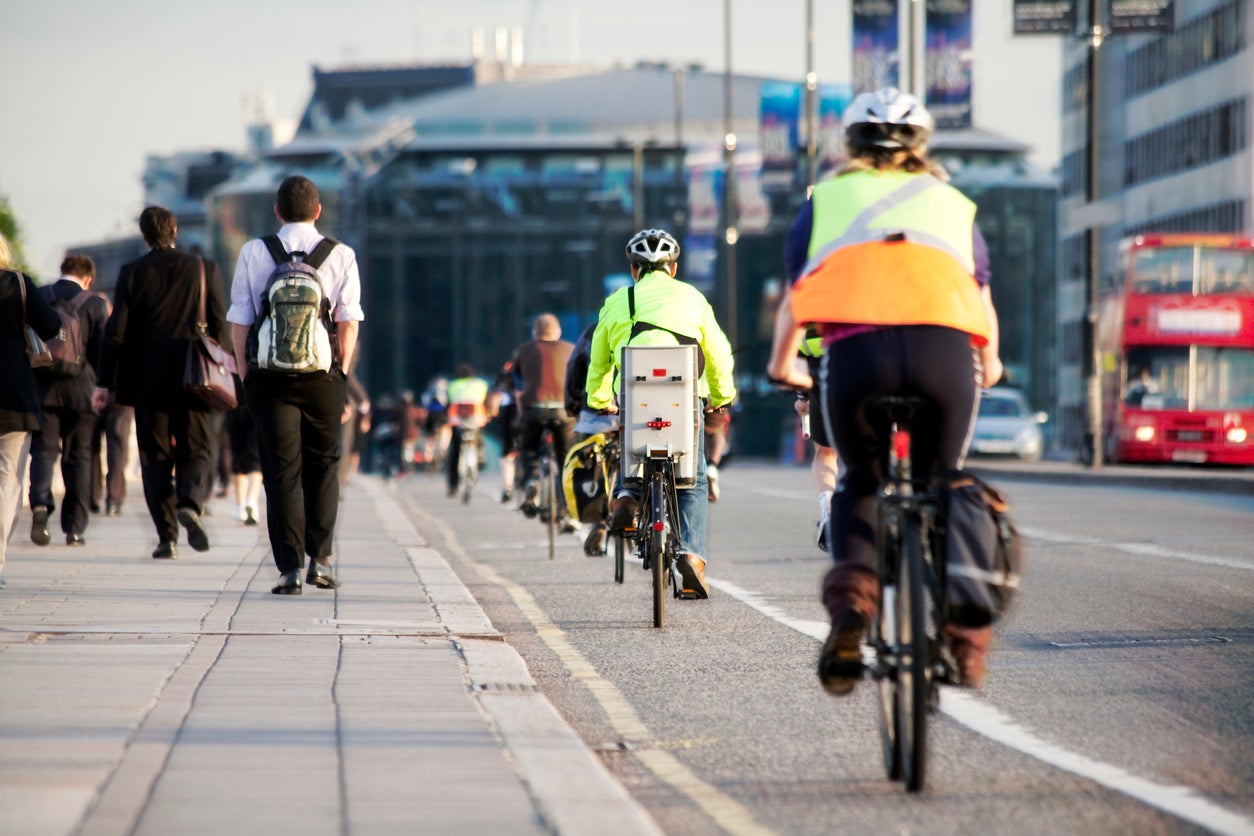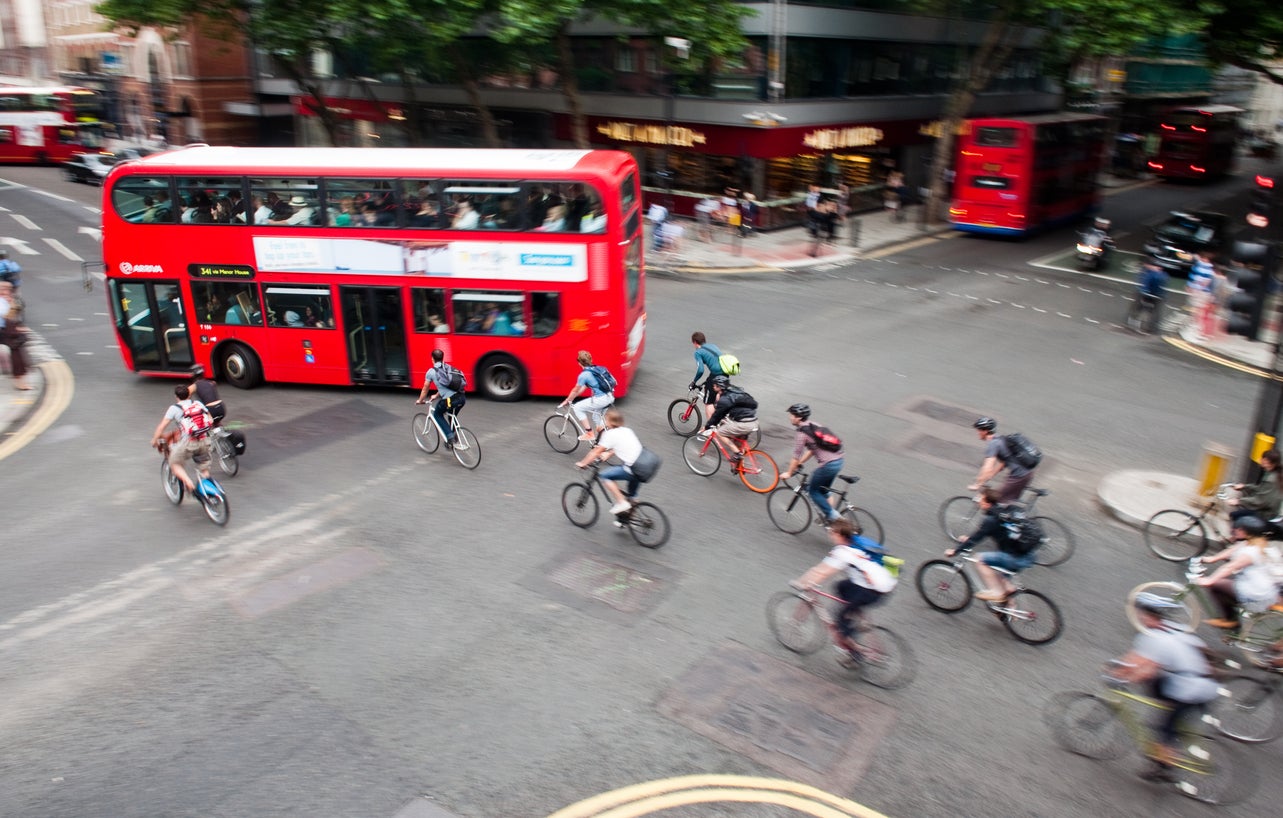'Feel the fear and cycle anyway: How I overcame my fear of cycling in the city and how you can too'
Getting on your bike is easier said than done, says Helen Coffey, but don’t let that stop you


To see me happily trundling along the streets of London-town on my perky Dutch bike, its pale blue frame complimented by statement purple wheel rims, you’d never guess that cycling was once my greatest nemesis.
If you’re scared of cycling, please believe me when I say that I’m not one of those people who will breeze over your completely legitimate concerns and tell you “it’s fine”. Because it’s not. Of course it’s not. Whatever the reality, it can feel like you’re taking your life in your hands every time you mount that saddle.
And up until about two years ago, I would have been right there with you, my friend. I even used to say, in increasingly defensive tones, that I would describe myself as having a phobia of cycling, were it not for the fact that “a phobia is an irrational fear, and being afraid of getting on a bike in the middle of a busy city is totally rational, actually”.
Partly this was down to my not having been on a bike in any meaningful way since childhood. Even then, our main cycling activity comprised of cruising around the back garden and pretending the trikes, bikes and scooters were horses at a riding stables. As it turns out, this does not set you up well for a future road-cycling career.
As far as I can remember, in eight years of living in London I’d never even hired a Santander bike or had a go on my boyfriend’s. I sneered at such folly. But then, almost overnight, a perfect storm created the impetus I needed to shake off my… well yes, let’s go ahead and call it a phobia.
I was constantly overspending and wanted to save some money; after six months on The Independent's lifestyle desk, where a regular feature of the day was being sent boxes of cronuts and Domino's pizza for no apparent reason, I was tipping the scales a tad too much; and I hated my hour-long commute with an all-consuming passion.
A colleague signed up to the Cycle to Work Scheme, where your employer essentially buys you a bike and the cost gets taken off your salary in manageable instalments for a year; and when she told me about it, something went “ping” in my head.
“Maybe I should do that!” I thought, while various other parts of my brain started screaming about DEATH and DOOOOOM in all caps. But it was like a religious conversion. One minute, cycling wasn’t even remotely going to feature in the roadmap of my life, not ever. The next… It just glimmered there, the kernel of an idea that I couldn’t shake off.
Whatever the reality, it can feel like you’re taking your life in your hands every time you mount that saddle
Two years on, I can honestly say it was one of the best decisions I ever made. Overcoming my fear has seen me get fitter, richer and happier – whizzing around Regent’s Park, watching with a dazed smile as the leaves change from green, to gold, to gone, is as far away as you can get from the usual grimy, overcrowded urban commute.
Right now, as lockdown restrictions ease, many Brits are in the alarming position of being told to go back to work while simultaneously instructed to avoid public transport. Particularly in the capital, where using the tube or bus is far more common than travelling by car, it feels like something of a Catch-22. But it could also be the moment where you experience your own personal version of that Damascene moment – where the desire to get around without worrying about coronavirus is temporarily stronger than your terror of travelling by two wheels. In which case, read on; this is all my wisdom on feeling the fear and cycling anyway.

Find the right route
However long you’ve been cycling, there are always certain roads on which you fear to tread (well, pedal). Just because you’re experienced, doesn’t mean finding yourself suddenly on the Old Kent Road is any less of a s*** show. Most of us don’t lead very exotic lives, and therefore we’ll only have two or three routes we do on a particularly regular basis, with the main one being the journey between home and work. Don’t just pick the first suggestion Google Maps throws out – weigh up the options. Look for routes with dedicated cycle lanes, less busy back streets and specially marked Quietways (if you’re in London).
Familiarise yourself
Again, even experienced cyclists know that familiar = safer. If you know every inch of a route – where to turn, where the traffic lights will be, when to indicate – you can do that bit on autopilot while all your concentration is focused on what other road users are doing. Once you’ve picked your route, walk it a few times, if you can, just to get acquainted. Then, once you’re on the bike, do exactly the same route every time – don’t try to jazz it up or make it interesting. Let it become automatic; I promise, the more you do it, the calmer you’ll feel.
Build in extra time
When you’re starting out, the last thing you want to be worrying about is being late for work because you took a wrong turn or came up against some unexpected road works. For the first few weeks, I already had a massive surge of adrenaline and anxiety every time I started pedalling, purely because it was all so new and strange. Give yourself a massive buffer of time – half an hour or more extra – so that you don’t have to rush or stress out about punctuality.
Grab a buddy
I really recommend asking an experienced cyclist to accompany you the first couple of times you go out on the bike. It is deeply reassuring to know that, if anything were to happen, you’re not alone. It’s also instructive to watch someone who knows what they’re doing – observe how and when they signal, how often they check behind them for cars, when they start to slow down at traffic lights. There are also cycling proficiency-type courses you can take (it’s not just for kids) – these have temporarily stopped during lockdown, but remind yourself to sign up for one later down the line as they are a huge confidence-booster.
Play by the rules
I feel like I don’t need to tell you this but I will anyway. Don’t cycle through red lights. Or pedestrian crossings when there are pedestrians there. Stop at Stop signs. Even if all the other cyclists are playing fast and loose with the rules of the road, doesn’t mean you have to. It helps to control the fear, too, if you know you’re doing everything by the book.
Get the gear
The safer you are, the safer you’ll feel. With cycling, this does mean purchasing a few things – a helmet, obviously, but also as much fluoro-wear as you can muster. Front and back bikes lights are also essential for when it gets dark, although this is less of an issue in summer. Do everything in your power to make yourself visible to other road users.

Don’t be a wallflower
The best bit of advice I was given when new to cycling was this: own your space on the road. Don’t apologise for being there. It’s tempting to try to squish yourself next to the pavement, cringing away from the cars, but this attitude doesn’t actually improve your safety. Be present, be confident and, dare I say it, be fearless.
Have some perspective
Fear is usually emotion-based, rather than logic-based. Still, it can be a good exercise to remind yourself of the realities when it comes to risk. For example, Department for Transport figures show that, for every billion miles cycled, there are 29 deaths. Meanwhile, for every billion miles walked, 34 people are killed. And you’re not afraid every time you set foot out of the house on two legs, are you? There will always be risks in life, but they should be carefully weighed against the ultimate rewards. Trust me: cycling is totally worth it.
Join our commenting forum
Join thought-provoking conversations, follow other Independent readers and see their replies
Comments
Bookmark popover
Removed from bookmarks